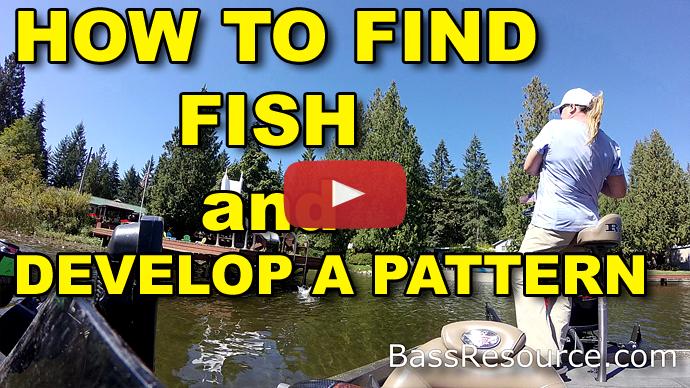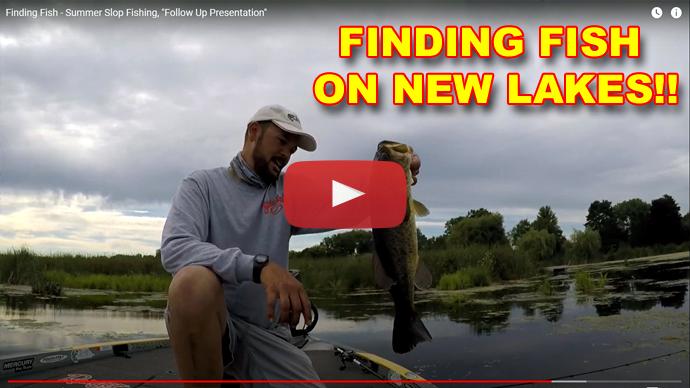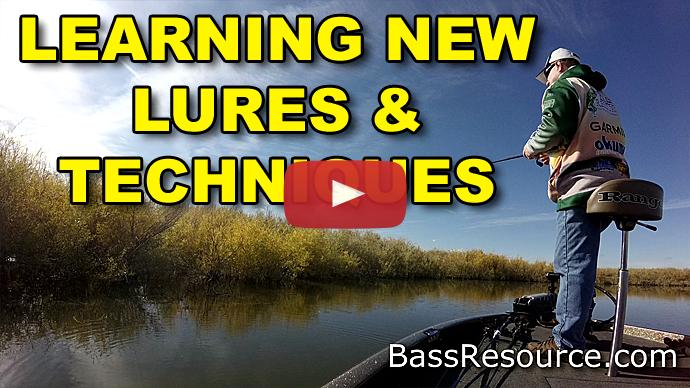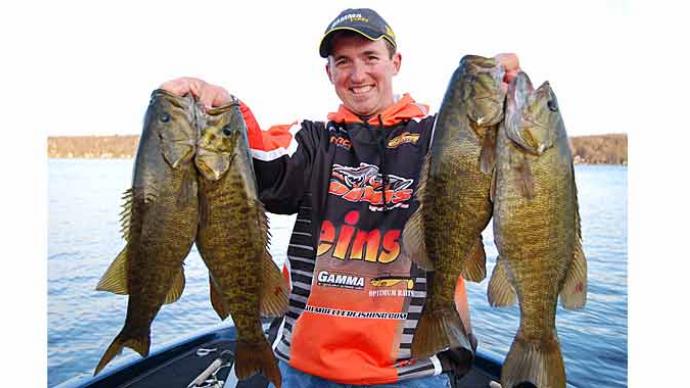Glenn: Hey folks, Glenn May here with BassResource.com, and today I'm asking the elite pros questions that you submitted on our forums. Let's see what they have to say.
Chris from Maryland, he asked, "If you were scheduled to fish a lake or river that you've not had the chance to pre-fish or haven't fished in a long time, what are the three most important things you look at?"
Gerald Swindle: Time of year, water temperature, and water clarity. That pretty much determines what you're going to fish, how you're going to fish, and where you're going to fish. The water temp can always tell you is it spawn, if it's just spring and the water temperature is 60 degrees then we know there's probably some fish spawning. If it's the fall and the water temperature is 60 degrees we probably know the fish are headed to the back of the creek. So, your water temperature is always going to be crucial. The time of the year is gonna dictate kinda where the fish should be, teamed with the water temperature, and then the clarity would be what color bait you'd fish and what style you would fish.
Glenn: What are the three most important things you look for?
Jason Christie: Well, a river...be safe, because, you know, rivers...I think of rivers and I think of the Arkansas River, stumpy and stuff like that. Be careful. Just, the conditions, if I haven't been to a place, you can always show up to an event and just fish the conditions, fish wind. If I haven't been there, I'm not practicing, and the wind's blowing 20, I'm gonna run out there and I'm gonna go to the windiest banks, and fish moving baits, and I've won a lot of tournaments doing that. I've won a lot of big tournaments doing that.
Wind's not blowing? That's kinda...that might be a little tough, but, you know, if they're spawning or if they're deep, pick you a place on the map out there and go out there and start dragging deep. You just really have to fish...you really have to fish the conditions and just develop some confidence quickly and figure out that pattern as quick as you can if you haven't been there.
And believe in yourself. If you get...one bite is not a pattern. Two bites, maybe. Three, you're good. You get that third bite doing something, have confidence that what you have figured out is the right thing, and have confidence in yourself to run it.
Glenn: That works for me. That makes total sense too, because when you go out on the lake you've gotta throw what you're confident in, but most importantly, start off with more of a search type bait. See what's going on, and that plays into what you just said. Go to a windy bank, go to a windy area, throw a fast moving bait. I mean, covering water looking for those bites, that's what I'm hearing, right?
Jason: Yeah, you wanna...in our practice periods, and whenever we get to a lake that I've not been to or haven't been to in a long time, I'm going to fish as fast as possible. And it's...if anything, it's just where I can see the entire lake, or a big part of it, and get a feel for it. You can fish through an area and just think about it. If you were to go through it real slow, you'd get 5 bites...say you'd get 5 bites. If I go through it real fast, I get 1 or 2. I kinda equate that to getting...I feel like,"Hey, if I get 1 or 2, if I come back through there and slow down I can probably get more," but also that lets me cover a big part of the area and a big part of the lake because we only get two and a half days. And you may see after you spend a day on the south end practicing and you're going granny slow, well by the end of the second day you get up there and there's topped out hydrilla on the upper end, you probably know that you made a mistake and you've missed out on all that time.
So, you wanna kind of...when I get to a lake, the first day, I kinda pick an area and I fish, and I just take off and I fish everything and I develop some kind of pattern. And then the second day is my run around and try to pick the best areas for that pattern. And then the third day is just go and make sure I hadn't missed anything. And it works. Everybody has a little different way of doing it, but whenever you haven't been there, you have no history there or anything like that, you just have to move and move until you get it figured out.
Justin Lucas: If I haven't fished them in a long time, my number one's gonna be what time of year is it? What stage should the fish be in? I'd wanna know that. I would wanna know what the weather pattern was leading a week up to there, and what the water level is wherever I'm going too. Knowing the water level, whether it's high, low, if I had been there before, what it is comparable to that. So many times, so often, we go places where the water level is just different, and you can't go back to the same areas and catch fish. You have to fish new ones, and paying attention to the water level at the lake or river wherever you're at is extremely important.
Glenn: So don't fish memories.
Justin: Try not to. I've heard Brent Ehrler say it before and I really do it myself. I try not to save too many waypoints unless it's a hard object that I know is gonna be there forever. If it's a rock pile or something like that. I try not to save waypoints because they're always changing and I don't want to go back and fish stuff that was good before. Doesn't always...rarely means that it'll be good again.
Glenn: So let's say I take you to a lake you've never seen before. What's the first thing...Two things, what's the first thing you look for, and what's the first bait you pull out?
Justin: That's an interesting question. First thing I would look at, water clarity, and if was dirty I'm probably gonna pull out some kind of spinner bait, crank bait, something like that, Berkely Squarebull, cover a lot of water. And if it's clean water I'm probably gonna pull out some kind of Berkely plastic. Maybe it's a Pitboss that I'm flipping or a Havoc Bottom Hopper on a shaky head or drop shot.
Glenn: Perfect. What are the three most important things that you look for?
Chris Zaldain: Oh man, unfamiliar waters, that's my jam. I love fishing just run and gun style. I call it freestyle fishing. The first three things I look for, one is the most obvious cover in the lake. Like, let's say we've got a Florida lake that's a big round bowl. I'm gonna look for that one obvious dock with the green arrows sticking on it. I just...the most obvious piece of cover and that's generally where I start. So, that's one, or the most obvious main like point, whatever it is, I'll always start there to try to get me clues.
Two...wind. Wind is a huge, huge factor in what we do. Wind always blows no matter what. A lot of anglers run from the wind, and I like chasing the wind. I love fishing the windiest banks possible. Breaks up light penetration, it pushes baitfish in to some of those banks.
And three...water clarity. Water clarity is a big one. If it's a southern type lake where dominant patterns, like flipping a black and blue jig, I wanna find that dirty water. If we're up north I wanna find the cleanest water possible to throw those little worms and swimbaits, stuff like that.
Glenn: Great advice. I think that's...those three things will put you on fish, guys. Play this video again and listen to what he just told you.
Justin: Absolutely, I stick by those.
Kevin VanDam: That's a really good question, and we do this all the time. So, for me, I wanna come up with a general seasonal pattern and find out what areas I think are gonna fit that seasonal pattern for the type of body of water that you're going to, whether it's a river, a natural lake, a reservoir, a tidal body of water. So, I know that bass do certain things during each season of the year in those systems.
Then I wanna get out there and assess the exact conditions. Look at the water clarity, the habitat type, and then when I actually get out and start practicing I don't spend more than 10 minutes in one spot doing the same thing without having some kind of positive response. So, if I'm there for 10 minutes and nothing happens I'm gonna be moving on, I'm gonna be changing baits, I'm gonna be doing something different because if you spend an hour in each little location you go to, before you know it you've wasted your whole day.
Glenn: Now that's pre-fishing?
Kevin: Pre-fishing. Yep.
Glenn: So, what if you're fun fishing and you're not fishing tournaments and you've never been in this lake...
Kevin: Same thing. Pre-fishing, it's the same thing. You're trying to learn, you're trying to find them, you wanna do it as quick as you can.
Glenn: And there you have it. Great questions from the pros answering your questions that were submitted on the forums on BassResource.com. For more videos like this, check out our YouTube channel or visit BassResource.com.




